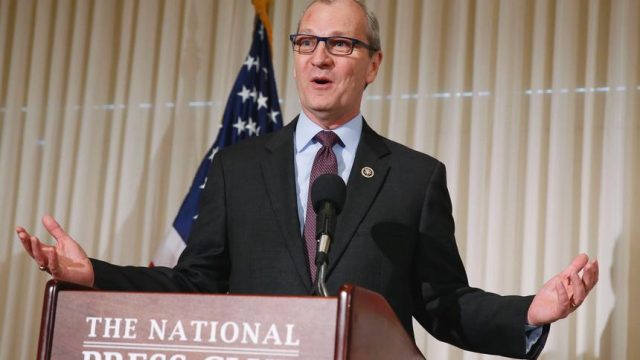Bias in Journalism Is a Real Problem, but Congressional Hearings Are the Wrong Solution

U.S. Representative Kevin Cramer (R-ND) talks at the public launch of the U.S. Agriculture Coalition for Cuba while at the National Press Club in Washington, DC, U.S. on January 8, 2015. REUTERS/Larry Downing/File photo
Last week Rep. Kevin Cramer, North Dakota’s at-large member of Congress, wrote a letter to the heads of America’s four major television broadcast companies warning them that he intends to hold hearings regarding their bias in covering the 2016 presidential elections.
Cramer’s opponent in the 2016 elections, Democrat Chase Iron Eyes, called the proposed hearings an “utter waste of taxpayer money,” and he’s right.
Not only would the hearings be a waste of time and money, the government simply has no business dictating content standards to broadcasters, whether it’s regulations for language and nudity or mandated balance in political coverage.
Media outlets, whatever the medium, should operate free of government interference. Even broadcast stations operating on airwaves governed by the FCC. The federal government’s regulation of the broadcast spectrum does not, I believe, give them the right to manage content. Even though they have in the past. A lot.
Anyway, today the Grand Forks Herald takes Cramer to task over his proposal, and while I largely agree with their conclusions on the hearings, they forgot to address the elephant in the room.
[mks_pullquote align=”right” width=”300″ size=”24″ bg_color=”#ffffff” txt_color=”#000000″]I’m not sure how you can expect fair-minded coverage of controversial political topics from newsrooms which tend to be ideologically homologous.[/mks_pullquote]
While Cramer’s hearings for media bias may be ill-advised, the problem motivating the call for them is very real.
For instance, email leaks show that CNN apparently asked the Democratic National Committee for questions in advance of interviews with Republican candidates like Donald Trump and Senator Ted Cruz. This comes after other emails showed former CNN contributor, and current head of the DNC, leaking debate questions to the Hillary Clinton campaign.
A Center for Public Integrity report shows that in 2016 working journalists showered money on the Clinton campaign. Just 7 percent of journalists identify as Republicans, a number which drops to exactly zero among the 72 members of the White House press corps (though more than 25 percent identify as Democrats).
The press had a love affair with Trump during the primaries – a report from Harvard’s Shorenstein Center found pre-primary coverage of the bombastic Republican candidate was mostly positive and more prolific than the coverage of any other candidate – but turned on him once he became the nominee. “Since the nominating conventions in July, Donald Trump has enjoyed significantly more airtime on broadcast networks than rival Hillary, but almost all of it—91 percent—has been negative,” Townhall reported last month.
I’m not Trump defender. I’m on record calling the man a cretin, and I will not be voting for him. But this flip-flop in the tone of his coverage should be embarrassing for journalists everywhere.
The journalism industry is saturated with people, at every level, who hold left-of-center views. “Study after study has shown that the mainstream media leans left,” Fortune’s Chris Matthews wrote roughly a year ago. And he notes that while we have seen the rise of Fox News, and conservative online media, most Americans still get their news from broadcast television and other traditional media outlets.
Meanwhile, trust in journalism is at a historic low according to Gallup which has been tracking that metric for decades.
Granted, not all bias is partisan or ideological. There is also a very large bias toward controversy and remunerative stories (probably the best explanations for the positive pre-primary coverage of Trump). But ideological bias exists, and for the most part it isn’t favoring the tens of millions of right-of-center Americans who identify as Republicans or conservatives or libertarians.
That’s a real problem the journalism industry should worry about. We hear plenty of concern about racial and gender diversity in the media, but the problem of viewpoint diversity tends to get dismissed or ignored.
I’m not sure how you can expect fair-minded coverage of controversial political topics from newsrooms which tend to be ideologically homologous.
By all means, dismiss Cramer’s cockamamie call for hearings on media bias. That’s the wrong venue for the problem. But don’t dismiss the reality of the problem, either.




